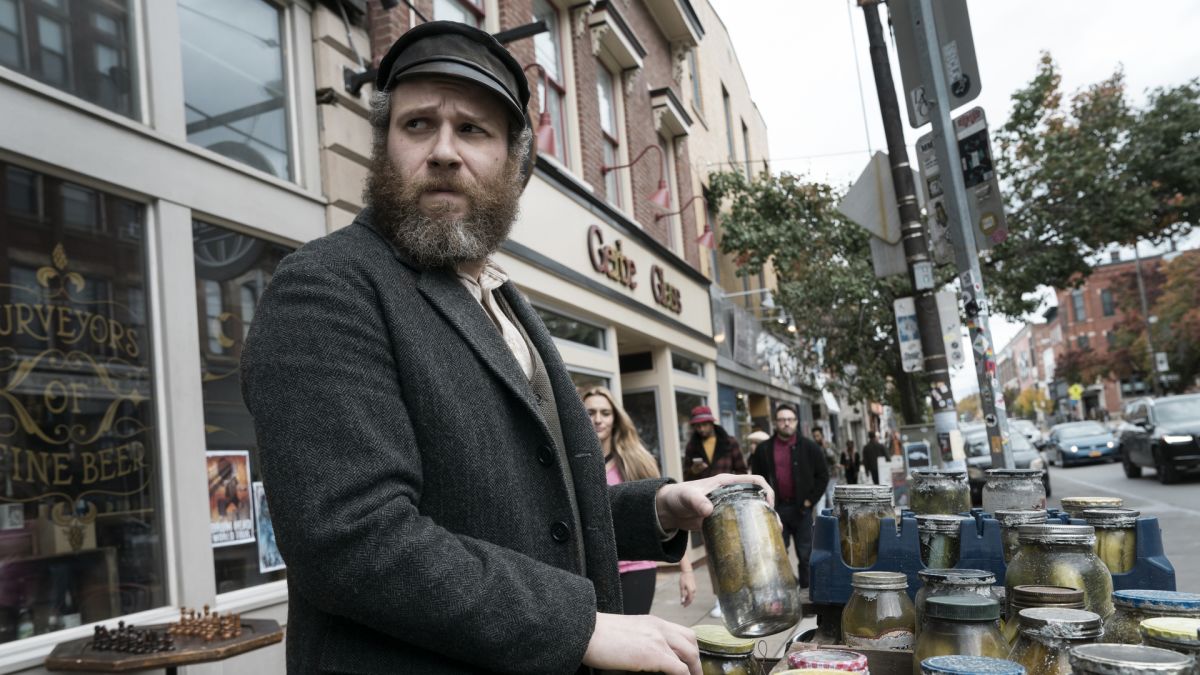
In An American Pickle, an HBO Max original film, Seth Rogan is Herschel Greenbaum, a recent American immigrant who, upon fleeing his shtetl from Russian Cossacks in 1919, falls into a vat of brining pickles a short time into his new Brooklyn life. Seth Rogan is also Ben Greenbaum, Herschel’s great-grandson, and only living relative when Herschel awakes in 2019 Rip Van Winkle-style. An American Pickle is ridiculous and it knows it. At only an hour and a half long, the first ten minutes of the film dismisses any attempt to rationalize its bizarre plot by pointing out its absurdity so viewers can just laugh it off, accept it, and move on with the show.
Once you’re buckled in though, and you’ve accepted the pickling of it all, the real plot of An American Pickle revolves around Herschel’s discovery that his family’s grave plots have been desecrated and a Russian vodka company has put up a huge billboard over the property. He schemes to start a pickle company to buy the plot and avenge his family’s honor, while Ben is preoccupied struggling to market an app he’s been designing for five years, Boop Bop.
Is An American Pickle hilarious, comedy gold? No, not particularly. But is it sufficiently funny in its comedic moments to warrant watching for a few chuckles? Certainly. However, my interest in An American Pickle is much less in its comedy than it is in its commentary and reflection of the Millenial American-Jewish experience.
Prior to the release of An American Pickle, and frequently thereafter, every corner of the world of American Jewish punditry had something to say about Rogan and the film. There were those both lauding and hearing Rogan for (misconstrued and selectively edited) comments he made on a podcast about Israel and the Millenial American-Jewish experience as it pertained to the movie. There were those lamenting the glaring lack of mention of the Holocaust or any other number of major Jewish events in the century following Herschel’s pickling, while others have complained its Jewishness is too schticky.
Nonetheless, it’s as sacred a Jewish tradition as any for three Jews to hold five opinions on this movie, so here are some of mine: Herschel swearing Ben his eternal enemy over bringing shame to their family and then eventually reconciling is quintessential Jewishness. Ben maliciously turning Herschel from a folk hero to a pariah is kind of dumb, but it is entirely emblematic of the precarious place white Jews in America hold. One day we can hold all the same privileges as other white folks and the next, anti-Semitism can turn our worlds upside down, put our lives at risk, and existentially threaten the perpetuation of our people. And, foremost, An American Pickle represents exactly what it is to struggle with one’s identity and life as a Millenial American-Jew. An American pickle itself, if you will.
When you make a comedy movie deeply entrenched in Jewish stereotypes the way An American Pickle is, you better be damned sure you know what you’re doing. Just because a film is written, directed, and acted by Jews, doesn’t mean that it’s automatically exempt from inadvertently committing anti-Semitism. An American Pickle, to me, falls on the right side of this dangerous line to cross because its audience is Jews. When Herschel is depicted as a somewhat money-grubbing meiser, it comes across as more or less authentic to the Jewish experience because it’s for us and we’re in on the joke.
Unlike Uncut Gems or Harley Quinn, where, despite being written, directed, and in the case of the former, acted by Jews, where we aren’t the audience. When you put stereotypes about Jews and money, power, cheating, and poor family values in front of a non-Jewish audience it merely perpetuates stereotypes. And in doing so, it normalizes those images from non-Jewish audiences because it comes from Jewish voices, and inadvertently becomes anti-Semitism.
An American Pickle isn’t by any means peak Jewish comedy. Recent films like Jewish director Taika Waititi’s Jojo Rabbit fill this niche much better, while even playing for a general audience. But, where An American Pickle lacks in the comedy department, it continues to thrive in authenticity. That said, I concur with the myriad voices complaining that Ben’s plot to turn Herschel into the symbol of everything wrong with cancel culture, one way or another, is a bit contrived. I think the movie could have been funnier and more enjoyable as a whole if it took a different approach and left out the shock-comedy of Herschel just saying increasingly gross, racist, and sexist things. But, as a mechanism for understanding the thin line of American-Jewish whiteness, this bizarre plot is a perfect metaphor.
Frankly, even just my continued use of the term American-Jewish as opposed to Jewish-American is a hotly contested and loaded phrasing. So is calling Jews who are not explicitly Jews of Color, white. For our several thousand-year history, Jews have been ethnic minorities in every geopolitical boundary they have resided in – save for the modern state of Israel – and select brief moments in ancient history. More often than not, Jews have been granted second-class status, if not outright persecuted in the places they lived, even when by choice, by necessity, or by law they have lived in segregated communities. So to say we have a consistent crisis of identity, battle with assimilation, and understandable generational fear of persecution is all an understatement.

Where An American Pickle‘s portrayal of this predicament is so astute is in how one moment Herschel is seen as a funky dude with a hat, an accent, and some killer pickles and the next, he is hated by everyone. The Left and the Right both demonize him until he is eventually arbitrarily deported, just because the government can. And let’s be real, they probably would in real life if given the chance.
In other words, in one moment, Herschel is enjoying all of the privileges of his whiteness. He may have held virtually none of them when he first arrived in 1919 New York, but by 2019, nobody on the streets of Brooklyn would consider him anything but white. Granted, his Jewishness and even his orthodoxy are not apparent to most people, so that helps mask some of his potential discrimination. The moment Herschel gets himself canceled with his abhorrent, intentionally exaggerated outdated rhetoric and beliefs, he has to do what every Jew of a certain generation fears the most: he has to flee the country and escape persecution.
Yes, Herschel’s persecution has absolutely nothing to do with his Jewishness. It’s a comedy movie, so of course it doesn’t. But the metaphor is right there. White American-Jewishness sits on a thin line. On one side of it, all of the privileges of whiteness. On the other, the same hatred, vitriol, and violence that has beleaguered Jews for millennia. With anti-Semitism on the sharp rise in the United States the is one very important fact to point out. An American Pickle was filmed in Pittsburgh just days after the most deadly attack on Jews in American history took place. The existential fear of becoming othered, losing white privilege, and being persecuted, possibly violently, is incredibly complicated. But, it is real, and in its preposterous way, An American Pickle illustrates it spot-on.
As Herschel illustrates this existential threat, Ben’s struggle with his Jewishness, his Judaism, and the film itself represent the immediate struggle that many Millennial Jews in America endure. With American Jews increasingly less likely to participate in organized religion, or even self identify as Jews to people outside of their families, Rogan’s portrayal of Ben as a Jew who has retreated from his religion, culture, and traditions is very real, whether the generally older-than-Millennial critics like to admit it or not.
The very fact that the movie never mentions the Holocaust, or any of the other staple reference points older assimilated and semi-assimilated American-Jews have for what they believe is lacking in today’s Jewish education, is quintessential Millenial American-Jewishness. I won’t litigate what is and isn’t lacking in Jewish education in the United States today, progressive or otherwise. But in my experience, the reason it isn’t the constant talking point today it may have been for our parents’ and their parents’ generations isn’t that we’re trying to ignore it, or aren’t educated enough on its history. It’s because we live in a Jewish existence today that is in spite of the Holocaust, not because of it.
In spite of the Holocaust, white Jews in America now have the privilege to pass among other whites. We’re not living in abject fear of violent discrimination because of the shadow of the Holocaust, like our parents and grandparents, in much of the country, anyway. And so when An American Pickle chooses to portray a Jew from pre-Holocaust Europe and a Jew from 21st Century New York City, they aren’t the last remaining members of their family because of the Holocaust. They are the last remaining members in spite of the Holocaust.
And this is why I love the film’s ending so much. Ben, reluctant to turn to his religion or culture and its traditions, even in the face of the tragedy of losing his parents, eventually finds his own way back to Judaism. It isn’t in some grand commitment to any particular set of practices or stereotypical holiday celebration. It’s in a small gesture towards Herschel and his family. There’s no saying whether the events that transpire in An American Pickle will lead Ben to start attending a synagogue or join a Jewish group of peers or anything. But it becomes clear that whatever it was holding him back from identifying with his Judaism is at least softened up.
Herschel really stands in for every disappointed Jewish parent and grandparent of a Millennial who has stopped identifying as Jewish, as he expresses towards Ben himself. So if Ben is ever going to possibly go on to live a life identifying as a Jew and maybe one day to have a family that will go on to identify as Jewish, it’s going to have to be on his own terms. This is the message I hope all wayward Jewish Millennial could receive.
It doesn’t matter if you’re practicing or not, how you practice if you do, or whether your family is intermarried or otherwise. Being Jewish in America today is an absolute pickle. Let’s not make it more complicated by forcing expectations and restrictions on what is or isn’t valid Jewish identity. Let’s let people come to their own terms with their identity like Ben Greenbaum had the opportunity to.






